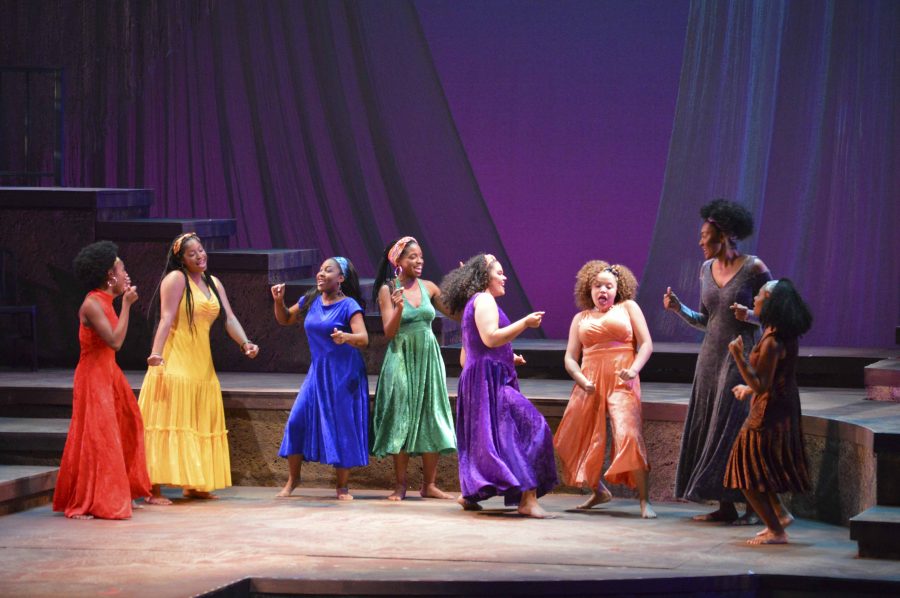“for colored girls…” Celebrates, Honors Black Women
Photo by Juliette Greene, Staff photographer
The cast of for colored girls who have considered suicide / when the rainbow is enuf performs a dress rehearsal Wednesday evening. The production opened yesterday at 7:30 p.m.
April 14, 2017
Editor’s note: This article contains references to topics including suicide and sexual assault.
Ntozake Shange’s for colored girls who have considered suicide / when the rainbow is enuf, which opened yesterday night in Hall Auditorium, is an evocative production spotlighting the experiences of Black women and femmes in the U.S. The piece is comprised of poetic monologues brought to life and woven together through dance and music. The different modes of performance in the piece make it difficult to categorize. Shange coined the term “choreopoem” to better encompass the relationship between performance and text, which feels more like choreographed poetry than a traditional theatrical production.
The vibrant cast is made up of characters identified not by name but by the color of their costume — The Lady in Red, The Lady in Blue and so on. Cast members deliver poetic monologues and engage with each other in larger scenes that address the nuances and complexities of subjects including childhood, coming of age, sexual assault, love, sensuality, poverty, oppression and self-realization. There is no single prevailing narrative in the piece; it is constantly moving, never lingering on one emotion or story for too long.
Professor Africana Studies and Chair of the Theater Department Caroline Jackson Smith, the director of for colored girls… describes the production as having a “blues aesthetic,” because the multiple stories and the scenes’ emotional layers turn on a dime, going from tragic to funny to romantic.
“It’s very emotional in a wonderful way,” she said. “It’s a piece of theater to really take a journey with and live with. There are so many serious topics, but to me, it’s fun. The fun is the sassiness of the women and the dance and the music and the call and response and the storytelling style.”
Because of the many intense topics that this piece addresses in vivid detail onstage, College senior Calypso Simone, who plays The Lady in Green, hopes that people who attend do so with the recognition that these narratives are drawn from the lived experiences of Black women.
“The things that we’ll be talking about in this choreopoem are very triggering things — in the title itself, it says ‘suicide,’” they said. “But for the sake of the spirit of the play … that Black girls don’t get trigger warnings; we get life. I think that it’s important to try to keep that in mind.”
Jackson Smith has a long history of involvement with this production, having seen one of its earliest performances in 1975. for colored girls… inspired her to become a theater director, and this production marks the fourth time she’s directed it since.
“It ignited my imagination because I had actually never seen any work for stage that seemed to be about my own personal experience,” she said. “I’d grown up going to Broadway plays, I was a lover of theater, but it never occurred to me that both in the style and the content I would see something that was so close to me.”
Jackson Smith shares many experiences with Shange that are reflected in for colored girls….
“It’s sort of the essence of me, this piece,” she said. “Ntozake Shange and I really lived the same experience, being born in the mid-20th century and living through what integration meant, what it meant to shift through all these different moments of how Black people and Black women were defining themselves. The piece really holds those moments in a way that is so reassuring and valuable to me.”
A generation later, for colored girls… is still inspiring Black women and femmes. Simone has dreamed of performing in the choreopoem since they were twelve.
“There’s very few staged things that are made specifically for Black girls — made not only to celebrate the lives that we live, but also to honor and recognize our struggles and how they unify and connect us,” they said. “Since the ’70s, not much has changed about the experience of the Black girl, the Black woman. … Something about it hit home for me. I understood where it was coming from, and I wanted to be a part of honoring all those truths and make art out of our truths.”
for colored girls… was the second major work by a Black woman to be performed on Broadway, after Lorraine Hansberry’s A Raisin in the Sun. The production was initially staged in bars and cafés as a series of loosely connected poems and evolved into the particular, intentional series that premiered on Broadway. Shange updated the script again in 2010, adding a poem about HIV and AIDS and referencing the Iraq War and Post-Traumatic Stress Disorder.
Jackson Smith said one of the most striking changes over the years has been men’s evolving responses to the choreopoem.
“When it first came out, there was a reaction from men — especially Black men — that this was an attack against them,” she said. “I would say that one of the main changes that I’ve seen over the years is I’ve seen men’s responses to seeing the play change. I’ve seen audiences of men not be defensive and not think it’s an attack on them and really be able to enter the experience and hear it the way it is.”
Although the script has undergone significant changes over the years, Jackson Smith also finds that the original topics raised by the choreopoem remain relevant for today’s audiences and performers.
“I think [today’s young women], for better or worse, are still experiencing the same kinds of things [as they were when the production was first staged] — struggling with relationships and power, finding joy in dance and community, dealing with friends and others who do consider suicide, have been raped, have had abortions. Sadly, these issues are not different.”
Jackson Smith hopes that this production of for colored girls… will stay with Oberlin audiences and have an influence on the way they see the world.
“I want people to feel like they’ve had an experience that impacts them, that changes something in the way they are thinking or feeling,” she said. “Because this is such a strongly feminist and woman-based experience, that is extremely important to me, that people think more about how the world is seen through women and Black women in particular.”
For College junior Chandler Browne, who plays The Lady in Purple, performing in for colored girls... is “transcendent.”
“I think the unique thing for me in for colored girls… is that I really personally identify … with the monologues that I have. … It’s just a very personal show. There’s nowhere to hide.”
Browne, along with Simone and double-degree sophomore Daniella Pruitt, who plays The Lady in Grey, perform the poem “sechita,” which is set in the bayou and references the Egyptian goddess of creativity, love, beauty and filth.
“[The scene is about] filth and creativity and disarray, and the beauty and creation in disarray, but also the sadness and anxiety and depression in filth and disarray,” Browne said. “Calypso is the terrestrial representation of Sechita in human form, and I am the spiritual representation of Sechita, and then Daniella is singing. It’s the three of us in this triangular unit of balance.”
Another poem, “latent rapists,” was ahead of its time in addressing date rape and victim blaming. The women talk about being raped not by “the stranger we always thot it wd be” but by acquaintances or friends and state that the “nature of rape has changed.”
For Jackson Smith, a particularly moving part of the production is the “no more love poems” sequence, comprised of four interconnected poems near the center of the choreopoem.
“They are the poems that I think of as where this idea of the women working through relationships starts to take a shift in the way they’re reflecting on their own experience,” she said. “They are so powerful in imagery and in awareness. There’s this line — ‘bein alive & bein a woman & bein colored is a metaphysical / dilemma / i haven’t conquered yet.’”
Jackson Smith and the cast have worked to emphasize the musical elements in this piece beyond what is written in the script and to use live music as much as possible. Pruitt’s character, who is original to Oberlin’s production of for colored girls... performs entirely in song. College senior and saxophone player Zoë Davidson, who plays The Lady in Brown, recorded a solo to accompany one poem. The cast is accompanied on piano by College junior Andre Cardine, the production’s music director.
“There’s a song that was created in the original production that I always use,” Jackson Smith said. “[No one] who picks up the printed version will … know it; it’s not there, but it’s traditional. And the song is ‘i found god in myself / & i loved her / i loved her fiercely.’”
Jackson Smith described the idea of “finding God in oneself ” as a critical thread woven through the choreopoem. She encouraged the cast to work through what that means to them personally and how they are going to express it on stage at the end of the play.
In a remarkable break from tradition, Jackson Smith decided to introduce two men — Cardine and College senior and choreographer Khalid Taylor — to play the characters of Men in Black for this production.
“This [decision] is controversial,” she said. “[It] was an experiment for me to see, ‘Does that violate in any way the spirit of the choreopoem?’ But I like it. As I’ve watched it more, I like that dynamic.”
College junior Deja Alexander, who plays The Lady in Yellow, hopes that Oberlin audience members will not only connect the production’s themes to the everyday realities of Black women within and outside of Oberlin, but take action in light of that.
“I would like people to think about the issues that we’re talking about and how they’re presented in the Oberlin culture and how they’re also presented in their home communities and the world at large,” she said. “Where do you see these stories, and how can you prevent Black women from going through these certain things? How can you aid us? How can you love us differently?”
for colored girls… will be running at Hall Auditorium April 13–15 at 7:30 p.m. and April 16 at 2 p.m. Tickets are $8, available for purchase through CTS online or in Hall.



















